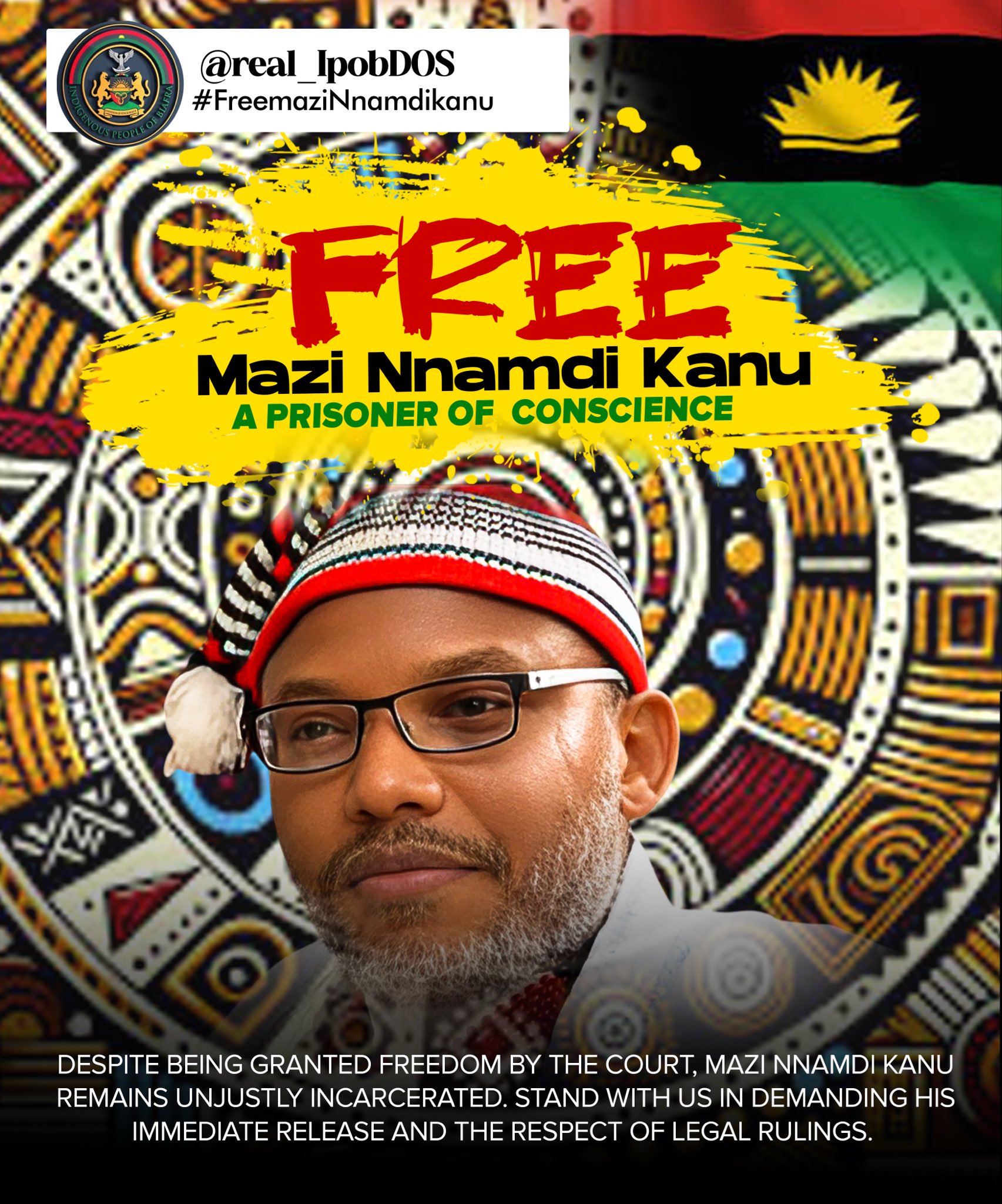
Nnamdi Kanu Conviction Sparks Outrage as Court Ignores Binding Judgments and Repealed Terrorism Laws
Abuja, Nigeria – November 20, 2025
A federal court on Thursday convicted Nnamdi Kanu, leader of the Indigenous People of Biafra (IPOB), on multiple counts under an already-repealed terrorism law, despite several existing court rulings that had previously declared his detention, extraordinary rendition, and trial unlawful.
The conviction has immediately intensified national tension and renewed international scrutiny over the Nigerian government’s handling of the case.
Justice Omotosho, in his remarks, labelled Mazi Nnamdi Kanu an “international terrorist,” despite multiple court rulings affirming his innocence and Nigerian law classifying anyone who tries a victim of extraordinary rendition as a terrorist.
Court Conviction Amid Overlooked Judgments
The judge ruled that the offences Kanu was convicted of carry a maximum penalty of life imprisonment or death, a declaration that has sparked outrage among supporters, legal scholars, and global observers.
Critics note that the court conveniently overlooked multiple binding judgments, including:
-
The Court of Appeal’s 2022 ruling, which discharged and acquitted Kanu, stating unequivocally that his extraordinary rendition from Kenya was illegal and that no court in Nigeria could try him.
-
The U.N. Working Group on Arbitrary Detention’s report, which demanded his immediate and unconditional release.
-
The High Court rulings affirming that his detention violated domestic and international law.
Despite these precedents, the trial proceeded, raising concerns of judicial compromise and political interference.
Sit-at-Home: A Civic Protest, Not Terrorism
The court’s position was that Kanu’s promotion of sit-at-home actions, a longstanding civil disobedience tactic in the region, met the statutory threshold for terrorism.
Supporters strongly reject this claim, noting that sit-at-home began as a voluntary civic protest against systemic injustice and the continued illegal detention of Kanu.
Prosecutors alleged that Kanu’s broadcasts and directives encouraged violence, though the state relied heavily on masked, unverifiable witnesses, raising questions about credibility and transparency.
IPOB’s Non-Violent Stance Ignored
Despite IPOB being globally known as a non-violent political movement advocating for a U.N.-supervised referendum on self-determination, the judgment repeatedly framed IPOB’s civil actions as criminal.
Crucially, no court in Nigeria has ever lawfully designated IPOB a terrorist organisation. Its proscription in 2017 was purely an executive action, not the outcome of any judicial process. In fact, on November 26, 2023, a Federal High Court ruled the proscription unconstitutional, faulted the South-East governors for enabling it, and ordered them to pay N8 billion in damages to Nnamdi Kanu.
Kanu Challenges the Legality of the Trial
Throughout the proceedings, Kanu maintained that the terrorism charges were invalid, as the sections of the Terrorism Prevention Act invoked by the prosecution had long been repealed.
He also raised jurisdictional questions, requesting the presiding judge to specify which valid Nigerian laws he was being tried under. Justice Omotosho refused to answer.
Kanu further complained of restricted access to lawyers and curtailed opportunities to present a defence, echoing concerns raised by legal observers.
Kanu has now described the entire process as a “miscarriage of justice based on illegality.”
Government vs. Freedom Advocates
Security authorities praised the ruling as a victory for the rule of law and a step toward restoring order in the southeast.
However, supporters, legal experts, and civil society groups say the opposite is true: the ruling undermines the rule of law and criminalizes democratic aspirations.
Citizens of Eastern Nigeria groups insist:
-
IPOB is non-violent.
-
The movement’s core demand, a referendum, is a democratic process recognized under international law.
-
The government is persecuting political dissent to suppress legitimate self-determination efforts.
International Protests
Mass demonstrations by the Biafran diaspora erupted this week across Europe and North America, including Italy, Spain, the United States, and the United Kingdom. Protesters accuse Nigeria of human-rights violations, ethnic persecution, and judicial manipulation.
Human Rights Concerns
Human rights groups and constitutional experts have condemned the conduct of the trial, noting:
-
Reliance on repealed laws
-
Disregard for previous appellate judgments
-
Denial of fair-hearing rights
-
The political undertone permeating the verdict
Many argue that the case has become a symbol of how state power can be weaponized to silence dissent.
Context: The Hijacked Sit-at-Home Narrative
While Nigerian authorities continue to blame IPOB for sit-at-home related violence, IPOB has repeatedly explained, along with evidence, that:
-
They suspended sit-at-home after the first day, on Mazi Nnamdi Kanu’s instruction.
-
The violence that followed was orchestrated by government-backed agent Simon Ekpa, used to tarnish IPOB’s image, this Ekpa confirmed through his social media handles.
-
Communities confirmed that violent enforcers were not IPOB members.
Growing Insecurity
The conviction comes amid a worsening national security crisis, including rising Fulani terrorist attacks, which many Nigerians say the government has failed to address. Critics question why peaceful agitators are persecuted while armed groups operate with impunity.
Political and Human Implications
Eastern Nigerians increasingly view the state as a threat to their safety and political existence. Analysts warn that today’s judgment may:
-
Deepen distrust in federal institutions
-
Intensify agitation for self-determination
-
Strain Nigeria’s already fragile political stability
A Turning Point
The conviction of Nnamdi Kanu marks one of the most consequential and polarizing moments in recent Nigerian history. Clearly Nigerians’ have long believed the judiciary is not independent, yesterday’s judgement seems to prove it.
With skyrocketing public anger, international demonstrations, and looming appeals, the legal and political battles ahead will likely reshape the dynamics of governance, justice, and self-determination in Nigeria for years to come.